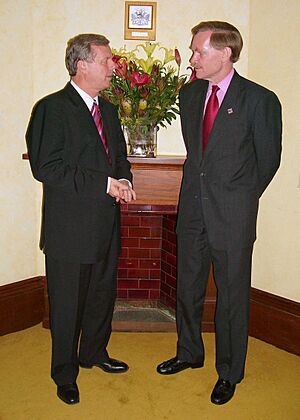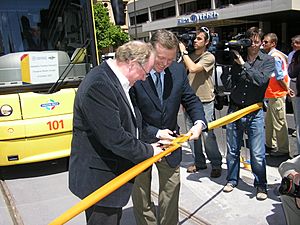Mike Rann facts for kids
Quick facts for kids
Mike Rann
|
|||||||||||||||||||||||||||||
|---|---|---|---|---|---|---|---|---|---|---|---|---|---|---|---|---|---|---|---|---|---|---|---|---|---|---|---|---|---|
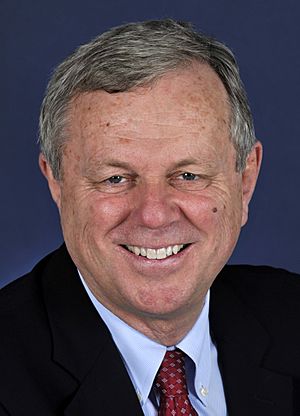 |
|||||||||||||||||||||||||||||
| 44th Premier of South Australia | |||||||||||||||||||||||||||||
| In office 5 March 2002 – 21 October 2011 |
|||||||||||||||||||||||||||||
| Monarch | Elizabeth II | ||||||||||||||||||||||||||||
| Governor | Marjorie Jackson-Nelson Kevin Scarce |
||||||||||||||||||||||||||||
| Deputy | Kevin Foley John Rau |
||||||||||||||||||||||||||||
| Preceded by | Rob Kerin | ||||||||||||||||||||||||||||
| Succeeded by | Jay Weatherill | ||||||||||||||||||||||||||||
|
|||||||||||||||||||||||||||||
| Leader of the Opposition in South Australia | |||||||||||||||||||||||||||||
| In office 20 September 1994 – 5 March 2002 |
|||||||||||||||||||||||||||||
| Deputy | Ralph Clarke Annette Hurley |
||||||||||||||||||||||||||||
| Preceded by | Lynn Arnold | ||||||||||||||||||||||||||||
| Succeeded by | Rob Kerin | ||||||||||||||||||||||||||||
| Leader of the South Australian Labor Party | |||||||||||||||||||||||||||||
| In office 20 September 1994 – 21 October 2011 |
|||||||||||||||||||||||||||||
| Deputy | Ralph Clarke Annette Hurley Kevin Foley John Rau |
||||||||||||||||||||||||||||
| Preceded by | Lynn Arnold | ||||||||||||||||||||||||||||
| Succeeded by | Jay Weatherill | ||||||||||||||||||||||||||||
| Deputy Leader of the South Australian Labor Party | |||||||||||||||||||||||||||||
| In office 14 December 1993 – 20 September 1994 |
|||||||||||||||||||||||||||||
| Leader | Dr. Lynn Arnold | ||||||||||||||||||||||||||||
| Preceded by | Frank Blevins | ||||||||||||||||||||||||||||
| Succeeded by | Ralph Clarke | ||||||||||||||||||||||||||||
| Minister for Business and Tourism | |||||||||||||||||||||||||||||
| In office 1 October 1992 – 14 December 1993 |
|||||||||||||||||||||||||||||
| Preceded by | Barbara Wiese | ||||||||||||||||||||||||||||
| Succeeded by | Graham Ingerson | ||||||||||||||||||||||||||||
| Minister of Employment and Further Education, Minister of Youth and Aboriginal Affairs | |||||||||||||||||||||||||||||
| In office 14 December 1989 – 1 October 1992 |
|||||||||||||||||||||||||||||
| Preceded by | Terry Hemmings | ||||||||||||||||||||||||||||
| Succeeded by | Kym Mayes | ||||||||||||||||||||||||||||
| Member of the South Australian House of Assembly |
|||||||||||||||||||||||||||||
| In office 7 December 1985 – 13 January 2012 |
|||||||||||||||||||||||||||||
| Preceded by | district established (Briggs) Lynn Arnold (Ramsay) |
||||||||||||||||||||||||||||
| Succeeded by | district abolished (Briggs) Zoe Bettison (Ramsay) |
||||||||||||||||||||||||||||
| Constituency | Briggs (1985–1993) Ramsay (1993–2012) |
||||||||||||||||||||||||||||
| Personal details | |||||||||||||||||||||||||||||
| Born |
Michael David Rann
5 January 1953 Sidcup, Kent, England, UK |
||||||||||||||||||||||||||||
| Political party | Australian Labor Party (SA) | ||||||||||||||||||||||||||||
| Other political affiliations |
New Zealand Labour Party (1970s) | ||||||||||||||||||||||||||||
| Spouses | Jenny Russell (divorced) Sasha Carruozzo (2006–present) |
||||||||||||||||||||||||||||
| Education | Northcote College | ||||||||||||||||||||||||||||
| Alma mater | University of Auckland | ||||||||||||||||||||||||||||
| Profession | Journalist | ||||||||||||||||||||||||||||
Michael David Rann (born 5 January 1953) is an Australian former politician. He was the 44th Premier of South Australia from 2002 to 2011. A Premier is the leader of a state government in Australia.
After his time as Premier, he served as Australia's top diplomat in other countries. He was the Australian High Commissioner to the United Kingdom from 2013 to 2014. A High Commissioner is like an ambassador for countries in the Commonwealth of Nations. He was also the Australian Ambassador to Italy, Albania, Libya and San Marino from 2014 to 2016.
Mike Rann grew up in the United Kingdom and New Zealand. He studied political science at the University of Auckland. Before becoming a politician, he worked as an advisor for Labor politicians in South Australia.
Rann became the leader of the Labor Party in South Australia in 1994. He also became the Leader of the Opposition in South Australia. The Opposition Leader leads the main party that is not in power. He led his party to form a government after the 2002 election. He stepped down as Premier in October 2011, and Jay Weatherill took over.
Rann is one of the longest-serving Premiers of South Australia. He was the Labor Party leader in South Australia for 17 years, from 1994 to 2011. He was a Member of Parliament (MP) in the House of Assembly from 1985 until he resigned in 2012.
Contents
Early Life and Education
Mike Rann was born in Sidcup, Kent, England. His father was an electrician who fought in World War II. His mother worked in a factory. Mike spent most of his childhood in South London with his father.
In 1962, when he was nine, his family moved from England to New Zealand. They lived in small towns like Mangakino and Matamata. Later, they moved to Birkenhead, New Zealand near Auckland, where he went to Northcote College.
He earned two degrees in political science from the University of Auckland. During his university years, he was involved in student activities. He was also a political journalist for the New Zealand Broadcasting Corporation.
In 1977, Rann moved to Adelaide, Australia. He worked as an advisor for the Premier of South Australia, Don Dunstan. He also worked for later Labor Premiers, Des Corcoran and John Bannon. During this time, Rann helped develop policies on important topics like civil liberties, Aboriginal land rights, and women's rights.
Becoming a Member of Parliament
Rann was elected to the South Australian Parliament in the 1985 election. He represented the area of Briggs in north Adelaide.
After the 1989 election, he became a minister. He was the Minister for Employment and Further Education, Minister of Youth Affairs, and Minister of Aboriginal Affairs.
As a minister, he helped create job programs for young people. He also expanded TAFE, which provides vocational training. He helped establish the new University of South Australia in 1991, which is now the biggest university in the state. As Minister of Aboriginal Affairs, he worked to clean up lands affected by nuclear tests. He also helped return sacred lands to the Maralinga Tjarutja people. As Minister of Tourism, he helped set up the South Australian Tourism Commission.
In the 1993 election, the Labor government lost power. This was mainly due to problems with the State Bank of South Australia. After this, Rann became the Deputy Leader of the Opposition. A few months later, he became the Leader of the Opposition in September 1994.
As Opposition Leader, Rann worked to reconnect with voters. He strongly opposed selling off public services like water and electricity. In the 1997 election, Labor gained many seats back. They almost won enough seats for Rann to become Premier.
Premier of South Australia (2002–2011)
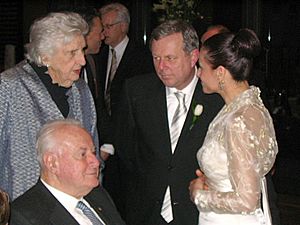
Mike Rann remained Leader of the Opposition until the 2002 election. After this election, Labor gained two seats from the Liberals. This meant Labor was one seat short of forming a government on its own.
After some discussions, Mike Rann was able to form a government with the support of independent politicians. He became the Premier of South Australia on 5 March 2002.
As Premier, Rann also held other important roles. He was the Minister for Economic Development, Minister for Social Inclusion, Minister for the Arts, and Minister for Sustainability and Climate Change. He worked to improve the state's economy, help people who were struggling, support the arts, and address climate change.
Achievements as Premier
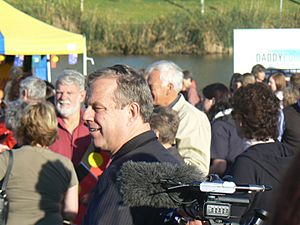
During his time as Premier, Mike Rann's government achieved many things. They increased job numbers and lowered unemployment. They also increased spending on schools, universities, health, and mental health services.
South Australia became a leader in renewable energy under his government. The state had the largest amount of wind power in Australia. They also explored hot rock power and used solar power for public services. The state's finances improved, earning a top credit rating.
Rann's government also supported the arts and culture. They funded theatres and introduced the Festival of Ideas. They also helped make major festivals like WOMADelaide, the Adelaide Fringe, and the Adelaide Festival of Arts annual events.
In the 2006 election, Rann was re-elected comfortably. His party won a large majority of seats. Many people saw him as the most popular Premier in Australia during his first two terms.
Third Term and Resignation
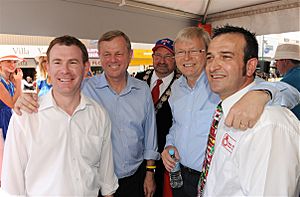
The Rann Labor government won a third term in the 2010 state election. This made it the longest-serving Labor government in South Australian history.
During this term, his government started many large infrastructure projects. These included updating Adelaide's train lines, expanding the Adelaide tram line, building a new Royal Adelaide Hospital, and redeveloping the Adelaide Oval. They also worked on expanding mining and defence industries.
In early 2011, Mike Rann changed his cabinet after his Deputy Premier, Kevin Foley, resigned. Later that year, in July 2011, Mike Rann announced he would step down as Premier. Jay Weatherill took over as the new Premier in October 2011.
Rann officially resigned from Parliament on 13 January 2012.
After Parliament
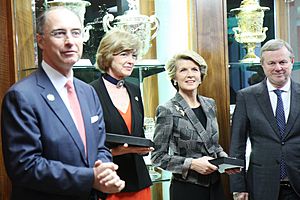
After leaving Parliament, Mike Rann took on several new roles. He became a professor at Flinders University and a visiting fellow at the University of Auckland. He also joined international groups focused on climate change.
In 2012, he was appointed chair of Low Carbon Australia Pty Ltd. This was a government bank that helped companies reduce carbon emissions.
On 23 August 2012, he became the Australian High Commissioner to the United Kingdom. He also served as Australia's Ambassador to Italy, San Marino, Albania, and Libya.
As of 2025, Mike Rann works as a business consultant for his own company, the Rann Strategy Group. In 2022, he joined the board of directors for a company called Spacetalk.
Personal Life
Mike Rann was married to Jenny Russell and they had two children, David and Eleanor. In 2006, he married his second wife, Sasha Carruozzo.
In 2020, Rann shared that he planned to live part of the year in Adelaide, Australia, and part of the year in Puglia, Italy. In Italy, he would produce olive oil.
Honours and Awards
Mike Rann has received several honours for his service:
- In 2016, he was made a Companion of the Order of Australia (AC). This is one of Australia's highest honours, given for great service to the country.
- In 2001, he received the Centenary Medal.
- He has also received honours from other countries, including Poland (2005), Greece (2007), and New Zealand (2009).
- In 2010, an environmental group in India named him a Global Champion of Climate Change.
See also
- Premier's Climate Change Council
- Rann government
 | Selma Burke |
 | Pauline Powell Burns |
 | Frederick J. Brown |
 | Robert Blackburn |


